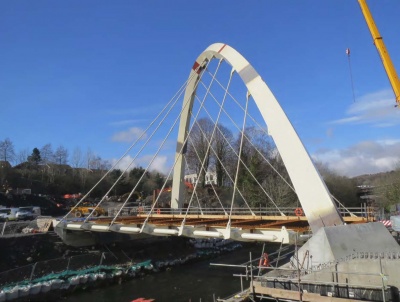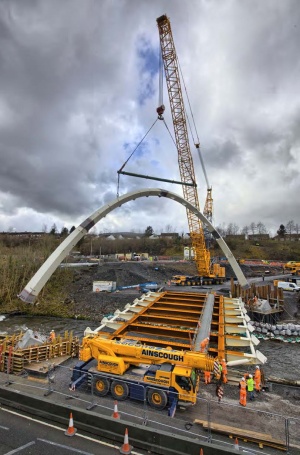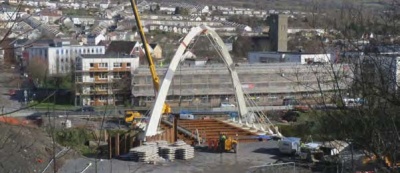River Taff Central Link Bridge, Merthyr Tydfil
Article in NSC September 2014
A bridge to town centre renewal
An iconic steel composite bridge forms the centrepiece of a multi-million pound regeneration scheme in the South Wales town of Merthyr Tydfil.
Spanning the River Taff and connecting a recently redeveloped college with the town centre, the River Taff Central Link Bridge forms an important element of Merthyr Tydfil’s £24M regeneration programme.
Funded by the European Regional Development Fund and Welsh Government, the regeneration masterplan encompasses a number of town centre enhancements with the new road bridge helping to make the riverside area an attractive destination for future investment.
The council’s Regeneration Manager Gavin Lewis wanted something that would be a feature and not simply a typical highway bridge structure. A number of design options went out to consultation with the local planning and highways authorities, together with other stakeholders, and the favoured design was for a bridge with an iconic arch.
Once a bridge design was selected locally based civil engineering company Alun Griffiths was chosen as the principal contractor for the project, while Mabey Bridge was awarded the bridge construction subcontract package.
Designed by Capita, the bridge’s stand out feature is 136t skewed arch. Measuring 40.9m across its base and reaching a maximum height of 18.5m, it was fabricated from 60mm thick plate. Connecting the arch to the bridge deck are a total of 14 × 80mm diameter hangers ranging in length from 4.7m to 22.5m.
One of the project’s main technical challenges revolved around the hangers and the associated cable tensioning. “During the non-linear analysis of the installation and stressing procedure for the hangers, we found that some hangers would go into compression if the full pre-stress design was induced in an adjacent hanger,” says Christopher Prosser, Capita Project Engineer. “We therefore had to design an incremental tensioning sequence to prevent this occurring. The designed sequence was later streamlined by Mabey Bridge during the construction phase in order to speed up the process.”
The appearance of the bridge was critical to the overall design and so it was decided that each hanger fin plate would be designed with the same geometry, but with varying orientation to suit the alignment of the hangers. This required Capita to extensively model each element to ensure there were no clashes and determine the practicalities of completing the internal welds, while ensuring the alignment of the hangers between the top and bottom plates was correct both aesthetically and structurally.
When designing the structure it was also necessary to take into account the BS EN 1993-1-11 requirement for the loss of a hanger without any restriction to live load capacity. “This required us to model what effect the loss of a hanger had on the remaining structural elements for the critical loading case. This analysis resulted in the increasing of the diameter of the hangersand associated fixings,” says Mr. Prosser.
For the site erection programme, the 29m long x 19.8m wide deck was the first steelwork to be installed earlier this year by Mabey Bridge. It is formed with a ladder configuration with two main 900mm deep × 600m wide outer girders, each 29m-long, connected by a series of nine crossbeams.
“We erected the deck steelwork using MEWPs positioned on each riverbank in conjunction with one 250t capacity crane,” says Andy Hosking, Mabey Bridge Project Manager. “Once the beams were erected we then bolted on the cantilevers which support the parapets as well as having the deck connection for the hangers.”
Mabey Bridge’s contract required it to have input in a number of aspects relating to the project, not just the steelwork detailing, but also construction methodology, and cable installation and stressing. However, the company’s main recommendation was to fully assemble the arch and then lift the complete structure into position.
This eliminated working at height as well as having environmental benefits as no trestles were installed into the fast flowing river. Working in this way also reduced the construction programme as steelwork fabrication was carried out off site by Mabey Bridge while Alun Griffiths was constructing the substructure on site.
The arch was transported to site in four equal sections from Mabey Bridge’s Newhouse manufacturing facility which is 88km away from Merthyr Tydfil. Once on site, the sections were placed on temporary trestles and welded together to produce the continuous and completed arch.
Using a single 550t capacity mobile crane positioned on one of the riverbanks, the entire arch was lifted into a vertical position, slewed over the river to its final position where it was fixed to the abutments. “The entire lifting procedure took eight hours and a large crowd, including school children and council representatives, gathered to watch,” says Mr Hosking.
Commenting on the bridge, which is scheduled to open in November, Daniel Francis, Project Manager for Merthyr Tydfil County Borough Council, says: “It is an iconic structure that also opens up areas of the town for future development. It is also a key structure in our redevelopment programme that will, along with a new road system, cater for our anticipated increase in visitors to the town.”
| Structural Engineer | Capita |
| Steelwork Contractor | Mabey Bridge |
| Principal Contractor | Alun Griffiths (Contractors) |
| Main Client | Merthyr Tydfil County Borough Council |






